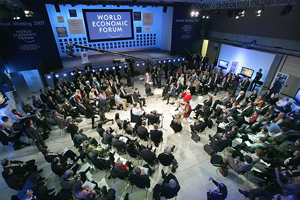The following is a guest post by Eric Clemons, Professor of Operations and Information Management at The Wharton School of the University of Pennsylvania.

After returning from the World Economic Forum in Davos, I have been thinking about how to build more perfect human societies out of the visibly and demonstrably imperfect human decision makers we have to rely upon. Any classically trained techie knows the answer — it’s feedback loops for error correction. That’s how affordable class B amplifiers are made out of cheap off-the-shelf components.
But what does that have to do with the governance of societies or the future of the high tech sector? So before Davos I was asked the typical “let’s diss Davos” question … “Is Davos anything more than a networking event?” I’d never been to Davos, I didn’t really understand Davos, and I gave the wrong answer. I tried to explain that it was more than networking. The correct answer, of course, is that there is nothing more than networking when trying to plan, to impose structure, and to create even more wealth from otherwise uncoordinated actions. There is nothing more important for the governance of civil and commercial society than people interacting, working together, learning about each other in a full frontal, full bandwidth interaction.
So…what did I learn from my high tech full frontals?
- Google is scarier than I thought. They know exactly what they are doing … from the launch of new free products to their settlement of class action litigation … and they have only one goal. Their successes are no accident and their setbacks are investments, not mistakes. They know what their goal is and you can probably guess. And no, they are not subsidizing the gPhone, the gDrive, or Google Office as their only remaining meaningful charitable contributions now that Bill and Melinda have already solved Malaria, HIV, and the other medical problems that beset Africa.
- Microsoft is now cuddlier than I thought. I have more affection than I used to for the beleaguered team in Redmond (Hell, I have affection for them for the first time). And I am counting on them to ensure that there is a counterbalance to Google. I like bipolar worlds, at least on the technology side.
- Facebook is worth a couple of looks below the obvious surface. If Google has had a plan, the Zuckerbergs may have been merely lucky at first. They (Mark and Randi) are a couple of delightful kids, the brother and sister team of idealists, making a better world one friending at a time. I know there is a business model in here somewhere. I know that they Zs will implement it without abusing my privacy. I hope that they can do it without trying to rely on push-it-out, in-your-face advertising.
- Before Davos I had thought that Michael Arrington of TechCrunch was a jerk. I now know that a lot of this reaction was envy on my part. I learned by watching up close that he is faster with a sound bite, a summary, or a quick insult than anyone else in the field, and that he would rather be physically assaulted than change what he writes. If he is a jerk he is definitely my kind of jerk.
More later on the future of paid search, the future of advertising, the future of online social networks and their impact on the marketplace, the relationship between internet penetration and the quality of American beer, the future of petites digerati in the workplace, later, if Arrington will have me back.